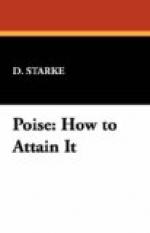Such are the benefits of reflection and of concentration which, when practised in a rational manner, will do more than anything else to help one to the attainment of poise.
Weak indulgence toward one’s own failings will be rejected by the strong. To know oneself thoroughly is a good way to improve oneself, and the knowledge that one is not mistaken as to one’s actual merits is of considerable help in acquiring poise.
It is for this reason that the habit of daily self-examination, that we recommended in the preceding chapter, develops, in the man who submits himself to it, faculties of judgment so keen that it is an easy matter for him to become his own educator in the path to betterment.
One great disadvantage of lack of proper concentration is that it gives to the subject one is anxious to study an importance greater than it really has.
Passion is too often an accompaniment of this form of reflection, emotions are aroused, and the nerves become active factors in distorting the real meanings and value of the things we are considering.
The remedy in this case is a very simple one. An effort of will, will readily banish the subject which is causing us too profound emotion by the simple process of turning the thoughts to some subject that will cause us no such disturbances.
Later on, when the emotions of the moment have passed, one can return to the former train of thought, forcing oneself to examine it with calmness.
Some amount of practise will be needed to acquire this mastery of one’s thoughts, the parent of poise, which is nothing more than courage based upon solid reason.
It may happen that the desire to follow a line of thought that causes us excessive emotion may lead to the inroad of a horde of secondary ideas, which press one upon the other without any perceptible continuity, carrying with them neither conviction nor illumination.
Reveries of this sort are dangerous enemies of poise. They lead one nowhere, and create in us habits which are not controlled by reason or common sense.
If such thoughts should assail us, the sole means of avoiding injury from them is to repulse them instantly, the moment one becomes conscious of them, and to banish the chaos of scattered fancies by devoting one’s whole mind to a single dominant thought that should be associated with the determination to obtain the mastery over oneself.
We have already suggested to the timid the advantage of foreseeing the objections that are likely to be made to what they may say. The mere fact that they have already formulated a mental answer will be a great assistance to the making of a successful retort.
To avoid still further risks of being confronted by a contradiction that may put them at a loss they will do well to adopt the following plan.
Let them put themselves in the place of the person to whom they plan to speak and then ask themselves if, under these circumstances, they will not find some objection to offer to the proposition concerned.




